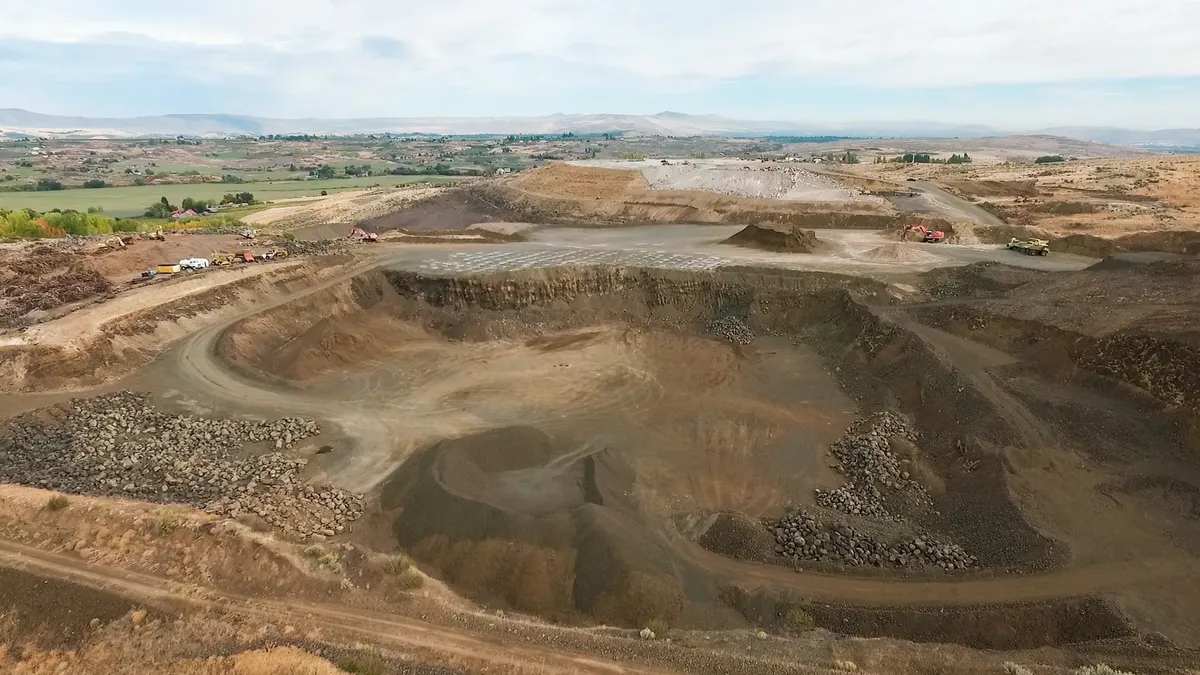Dive Brief:
- DTG Recycle, a Washington-based C&D recycler, has reopened its sole landfill following operating and air permit approvals. The newly named Rocky Top Environmental opened Dec. 12 after an 18-month renovation that included lining a cell.
- The site’s operating permit was previously denied by the Yakima Health District, forcing a shutdown in 2023. The Yakima Regional Clean Air Agency, or YRCAA, approved the site’s air permit in March 2024. It is now being challenged by a local environmental group.
- DTG is also pushing back on a proposed penalty of nearly $3.4 million by the state’s Utilities and Transportation Commission for allegedly transporting waste for disposal without the proper certificate. DTG filed a motion to dismiss that case last week.
Dive Insight:
DTG was long known in the Pacific Northwest for rapid growth through acquisitions, including the 2019 purchase of the former Anderson Landfill in Yakima. It attracted investment from Macquarie in 2022, but then it saw some of that growth stall.
The company’s last known acquisition was about two years ago. Since then, multiple top executives have departed, including its longtime CEO and later its founder. Macquarie sent in executives that had been involved in other portfolio companies to help during this period, and DTG announced a new CEO last spring.
The Yakima County site, regulated as a limited purpose landfill, is seen as a key asset to allow vertical integration. But it had been operating without a liner since opening in 1997 and started facing a range of questions from state and local regulators about the presence of volatile organic compounds in its emissions. A subsurface fire was also detected at the site in 2023 and remains ongoing, according to the latest monthly consultant report.
Following discussions and investments, regulators allowed the site to reopen with a permitted capacity of 1 million cubic yards per year. DTG said it has also added more capacity to divert recyclable material before disposal.
“We chose the name Rocky Top Environmental for the site to better honor the region it serves, and to accurately reflect its scope of activities,” said CEO Jordan Reber in a statement. “We undertook the significant capital project of lining the landfill portion of the site and have invested in upgrading and modernizing all aspects of our operations.”
This hasn’t convinced certain area residents, including the group Friends of Rocky Top that is challenging the air permit on the basis that a new State Environmental Policy Act review should have been conducted. YRCAA and DTG are aligned in opposition to this challenge.
Residents are also following new results from groundwater monitoring at the site, which detected levels of certain chemicals, including PFAS.
Meanwhile, in Snohomish County, DTG is facing another challenge due to a dispute over its hauling certificates.
Washington requires a solid waste certificate to haul waste, but DTG long operated without one as a C&D recycler. The state’s UTC said it communicated with DTG about this for years and requested that it apply for a certificate, but the company didn’t do so until July 2024.
According to the complaint, DTG “was transporting and disposing of solid waste” and also running ads “offering debris disposal services for residential and commercial recycling customers.”
DTG collected and managed 186,898 tons of waste for processing at its MRF in Snohomish County from January through June of 2023. An estimated 73,270 tons were sent for disposal as residuals. This equated to 3,389 truckloads, with a proposed penalty of $1,000 each.
The company disputed this narrative in a recent filing, which included a motion to dismiss. It said a third-party contractor was the one who hauled the material to a county-approved intermodal rail facility for transport to a Republic Services landfill. DTG described this as common practice, with support from WM as an intervenor, and it said a certificate is not required because it wasn’t profiting from the residuals.
DTG said in the filing that it “does not seek to expand its operations to include the collection and transport of solid waste.” The company touted diverting over 100,000 tons of material from disposal last year and described that activity as under threat from regulators.
“If the UTC’s cease-and-desist order is allowed to stand, all of that progress will stop, as will the vast majority of Washington’s capacity to recycle commercial and C&D materials,” said Reber in a statement.
The UTC’s response to this motion is due in the coming weeks, with the potential for an outcome as early as February.
Correction: This story has been updated to correct the proposed UTC penalty. It is $3,389,000.















